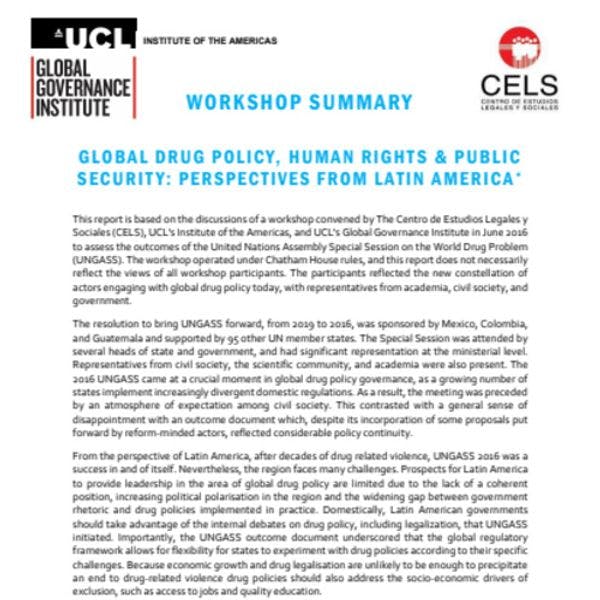Política global de drogas, derechos humanos y seguridad pública: perspectivas desde América Latina
Este informe, basado en los debates de un taller organizado conjuntamente por el Instituto de Gobernanza Mundial de la Universidad Colegio de Londres (UCL), el Instituto de las Américas de la UCL y el Centro de Estudios Legales y Sociales (CELS), explora la dinámica de la gobernanza en torno a la UNGASS de 2016 y se centra en la perspectiva latinoamericana de la Sesión Especial y la política global de drogas.
Más información, en inglés, está disponible abajo.
Suscríbase a las Alertas mensuales del IDPC para recibir información sobre cuestiones relacionadas con políticas sobre drogas.
This report is based on the discussions of a workshop convened by The Centro de Estudios Legales y Sociales (CELS), UCL's Institute of the Americas, and UCL's Global Governance Institute in June 2016 to assess the outcomes of the United Nations Assembly Special Session on the World Drug Problem (UNGASS). The workshop operated under Chatham House rules, and this report does not necessarily reflect the views of all workshop participants. The participants reflected the new constellation of actors engaging with global drug policy today, with representatives from academia, civil society, and government.
The resolution to bring UNGASS forward, from 2019 to 2016, was sponsored by Mexico, Colombia, and Guatemala and supported by 95 other UN member states. The Special Session was attended by several heads of state and government, and had significant representation at the ministerial level. Representatives from civil society, the scientific community, and academia were also present. The 2016 UNGASS came at a crucial moment in global drug policy governance, as a growing number of states implement increasingly divergent domestic regulations. As a result, the meeting was preceded by an atmosphere of expectation among civil society. This contrasted with a general sense of disappointment with an outcome document which, despite its incorporation of some proposals put forward by reform-minded actors, reflected considerable policy continuity.
From the perspective of Latin America, after decades of drug related violence, UNGASS 2016 was a success in and of itself. Nevertheless, the region faces many challenges. Prospects for Latin America to provide leadership in the area of global drug policy are limited due to the lack of a coherent position, increasing political polarisation in the region and the widening gap between government rhetoric and drug policies implemented in practice. Domestically, Latin American governments should take advantage of the internal debates on drug policy, including legalization, that UNGASS initiated. Importantly, the UNGASS outcome document underscored that the global regulatory framework allows for flexibility for states to experiment with drug policies according to their specific challenges. Because economic growth and drug legalisation are unlikely to be enough to precipitate an end to drug-related violence drug policies should also address the socio-economic drivers of exclusion, such as access to jobs and quality education.
Keep up-to-date with drug policy developments by subscribing to the IDPC Monthly Alert.
Descargas
Temas
- 2016 UNGASS
- Cannabis y sustancias relacionadas
- Participación de la sociedad civil
- Coca, cocaína y sustancias derivadas
- Cultivo de plantas consideradas ilegales
- Descriminalización
- Reformas de las leyes sobre drogas
- Violencia en relación a las drogas
- Derechos humanos
- Prisión y encarcelamiento
- Reducción de la oferta
- Crimen transnacional y organizado
- Desarrollo y medio ambiente
- Derechos humanos y justicia social
